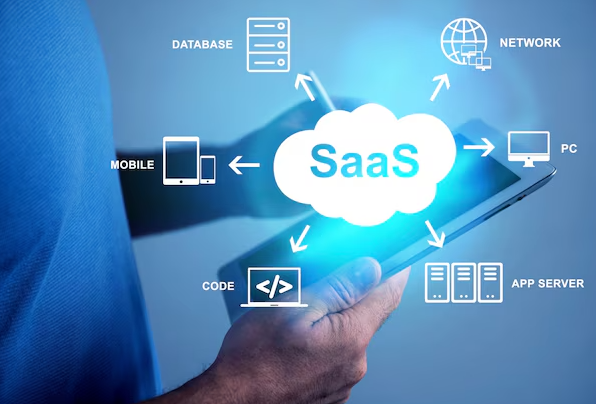
A new era of Software-as-a-Service (SaaS) is upon us — no longer just defined by its accessibility and scalability, but rather by its intelligence. In this era, artificial intelligence (AI) is one of the fundamentals of most modern SaaS applications, facilitating automation, predictive analytics, and scalable personalized user experiences.
This change for UK businesses could not come at a better time. With increased labour costs and an ever-increasing demand for higher standards of customer service, the inclusion of AI within SaaS platforms enables companies to stick to higher efficiency levels without corresponding increases in overheads. Marketing automation tools to enterprise analytics dashboards — AI-powered SaaS solutions are reshaping the way organisations gather insights, devise strategies, and serve customers.
The Trajectory of SaaS: Access — Automation — Cognitive
The initial benefit of SaaS when it was adopted more widely was accessibility, easily used software from virtually anywhere, and without any complicated installations. It earned a reputation for scalability and flexibility over a few years and still does. This led SaaS into the most revolutionary (with maximum granularity) phase of its evolution: the age of autonomous intelligence powered by AI.
Advanced SaaS tools are not simply data processors; they are data comprehenders. They can anticipate user requirements, automate actions, and learn over time from behavioural patterns. In the UK, this evolution resonates well with increasing demand for dynamic business tools that adjust to changing market and customer demands.
The integration of AI is a departure from reactive management to proactive intelligence — no longer systems that wait for instructions, but systems that can already indicate what is next.
By Far the Highest Value Add for AI for SaaS Applications
Automation of Repetitive Tasks
The quickest benefit that AI development can provide us is in the form of automation. AI-enabled SaaS platforms that automate complex business workflows reduce the need for human involvement and error. A good example is AI-infused CRM systems that automatically arrange your leads in the order that you should prioritize them, book your follow-ups, and even write email and call templates for you.
For service companies in the UK, this alleviates the workforce from data entry, with employees spending more time on strategic goodwill rather than administrative work, thereby improving productivity and morale. Automation is not a substitute for people — it is a complement to help them do more valuable work.
Predictive Analytics for Smarter Decision-Making
With the help of deep learning powered SaaS systems, immense datasets can be analysed, which results in finding patterns and reporting the responses they receive. For example, some marketing platforms predict campaign performance, just like finance tools predict cash flow risks, and some HR software predicts attrition risk.
For UK businesses that use data to inform strategy, predictive analytics allows decisions to be made in advance. Rather than responding to quarterly reports, companies can foresee problems and behave proactively, which provides them with an advantage over the competition.
Personalised User Experiences
Consumers crave personalisation — not that it is a new trend — but AI has made it possible at scale. AI SaaS platforms customize interface, recommendations, and notifications to users through their behaviour.
As an example, an eCommerce SaaS solution targeted towards retailers in the UK can leverage machine learning to customize product recommendations and, in the process, boost the conversion rate and customer satisfaction levels. This is the kind of adaptive intelligence that builds brand loyalty and makes software seem intuitively human.
Natural language processing is one of countless tools in the SaaS toolbox.
In the realm of SaaS, Natural Language Processing (NLP) is among the most important and powerful AI technologies. NLP implements the ability of systems to read, understand, and respond to human language, thus bridging the gap between the users and the data.
Over the last couple of years, most UK-based customer service platforms have been deploying AI chatbots and voice assistants to address customer queries in real-time. These systems don’t just have contextual awareness, but also learn from every interaction — and get more accurate as time goes by.
The end product is a more agile and efficient customer support that never sleeps and scales without the scaling cost. NLP has also emerged as a distinct advantage for SaaS providers, as it has enabled the delivery of seamless, contextually-aware engagement experiences.
The Dynamic Duo of AI and Data Security – How to Make Your Risk a Lever
Given the strict data protection laws in the UK, security remains a major concern for enterprises using SaaS in this country. On the other hand, AI, which is viewed as an evolutionary risk, ironically becomes part of the solution to stronger cybersecurity.
When it comes to detecting anomalies and possible breaches, AI-enabled SaaS platforms offer a distinct advantage over conventional monitoring tools. They learn what normal network behaviour is and immediately flag anomalous activity, cutting incident response time from hours to minutes.
With AI-enabled compliance monitoring, UK organisations will have the capability to continuously monitor their systems to ensure that they are complying with GDPR and/or ISO 27001 standards, reducing the burden of audits and building customers’ trust in every interaction.
The challenge of AI integration in SaaS
While the positives are strong, the right implementation of AI in SaaS applications must still be done strategically. The most common problem is data quality — AI models are only as good as the data they are trained on. However, for many UK organisations, the need to first clean, structure, and centralise their data is a prerequisite for all the promised benefits of AI.
Another area of growing concern is Ethical AI. Transparency is critical as algorithms handle more decisions algorithmically rather than human behaviour. Whatever industry people are working in, businesses should make their AI explainable and free from bias — and this is especially true in industries like finance and recruitment, where regulations are far apart.
On top of this are the anxiety-inducing costs and complexities associated with incorporating AI models. Adoption grows, but requires technical prowess and business alignment.
UK SaaS Providers – Leading The Way In The AI Revolution
The UK is a hotbed of AI-powered SaaS innovation. From London fintech startups to Manchester AI research labs, embedding intelligence layer by layer in software is becoming the new normal.
As an example, think of a logistics SaaS based company based out of Birmingham that integrated predictive AI to optimize delivery routes, resulting in increased optimization, reducing costs by 30% and lowering emissions. In another instance, a Leeds-based legal tech provider developed an NLP-driven document analysis system that automates the contract review process — eliminating hundreds of hours of work per month for law practices.
And these are just a handful of examples demonstrating that UK enterprises are not only adopting AI: they are transforming the meaning of efficiency and intelligence in software delivery.
How BestTech Can Help UK Presence With An AI-Powered SaaS App
We help UK companies modernise and scale their SaaS platforms with AI integration at its core at BestTech. Our process involves starting with your business goals, data landscape, and users. We then build AI workflows which deliver tangible business benefits — whether that be via automation, analytics, or personalisation.
From TensorFlow, Pytorch, OpenAI APIs to some heavyweight backend stacks such as Node, we are working on the latest technologies. JS, Python, and React. All AI systems are GDPR, FCA, and ISO 27001 compliant, so our team builds your intelligence ethically, securely, and to UK market specifications.
We develop AI-powered SaaS solutions from conception to deployment to empower better decision-making, lower costs, and improve user experience.
In conclusion: SaaS = smartER Software for a smartER Future.
AI is NOT a luxury for SaaS anymore, but a necessity. With the digitisation of the UK economy continuing at pace, companies that tap AI-enabled SaaS ecosystems will be some of the most agile, accurate, and innovative players out there.
Intelligence is the next frontier for SaaS — software that doesn’t just react but instead learns, predicts, and adapts. Having BestTech as your development partner, you can convert your platform by building it into a smart system that makes your platform work harder to process faster for your business.
In this data-driven world, integration with AI is not the next liquor; it is the norm.




